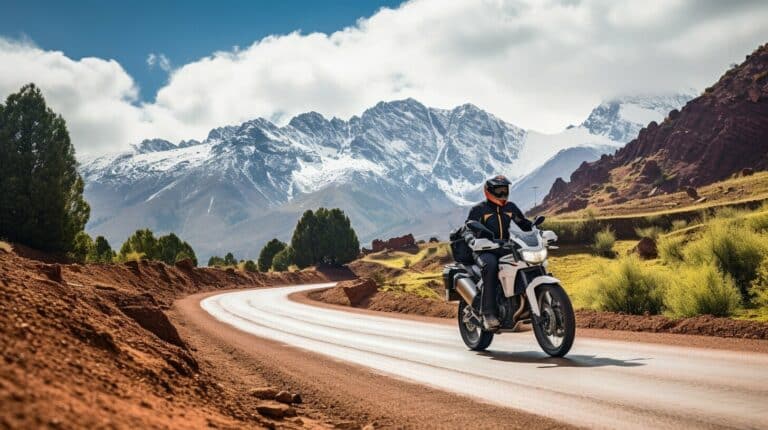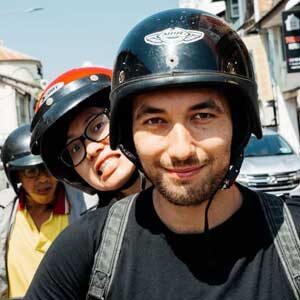Planning a motorcycle trip in Morocco? Here are 20 essential tips and laws to keep in mind for a safe and enjoyable journey.
1. Be prepared for the positives and negatives of traveling in Morocco.
2. Morocco is a predominantly Muslim country, so be aware of prayer calls and observe the customs.
3. Alcohol consumption is disallowed in Islam, but wine is available in supermarkets and some restaurants.
4. Morocco has diverse languages spoken, including Darija Arabic, Berber, French, and Spanish in the northern regions.
5. Morocco has a variety of climates, so research the weather before your trip.
6. Morocco is a cash-based economy, so be prepared to carry cash and have small denominations.
7. Mobile phones and SIM cards are widely available in Morocco, and you can rely on Google Maps for navigation.
8. Morocco’s infrastructure, including roads and railways, has been improved in recent years.
9. Be wary of touts and fake guides in tourist areas, particularly in cities like Marrakech and Fes.
10. Respect the dress code, especially for women, and dress modestly.
11. Haggling is a common practice in Moroccan markets, so be prepared to negotiate prices.
12. Keep small change with you as Moroccan cab drivers often claim to have no change.
13. Familiarize yourself with the local currency, the Moroccan Dirham, and be aware of exchange rates.
14. ATMs can sometimes run out of money in Morocco, so it’s wise to exchange currency beforehand.
15. Hiring a local guide can be helpful, but be aware that they may receive commissions from shops and may not always have your best interests at heart.
16. Be cautious of strangers offering free tours or directions, as they may expect a tip in return.
17. Fridays are a holy day in Morocco, and shops and attractions may be closed.
18. Stick to bottled water and avoid using ice to stay safe.
19. Pack Imodium for digestive issues that may arise from unfamiliar foods.
20. Be vigilant against pickpockets, especially in crowded areas.
Key Takeaways:
- Be mindful of local customs and observe prayer calls in Morocco.
- Research the diverse languages spoken and plan accordingly.
- Carry cash and be prepared to negotiate prices in markets.
- Stay cautious of potential scams and pickpockets.
- Familiarize yourself with the local currency and exchange rates.
Remember to always respect the local culture and customs, and enjoy your motorcycle trip in Morocco!
Understanding Moroccan Customs and Culture
Understanding the customs and culture of Morocco is crucial for a successful motorcycle trip, so familiarize yourself with the country’s travel tips and road regulations. Here are 20 tips and laws to know before your motorcycle trip in Morocco:
- Be prepared for the positives and negatives of traveling in Morocco.
- Morocco is a predominantly Muslim country, so be aware of prayer calls and observe the customs.
- Alcohol consumption is disallowed in Islam, but wine is available in supermarkets and some restaurants.
- Morocco has diverse languages spoken, including Darija Arabic, Berber, French, and Spanish in the northern regions.
- Morocco has a variety of climates, so research the weather before your trip.
As you immerse yourself in the rich culture of Morocco, keep in mind that it is a predominantly Muslim country. Be respectful of prayer calls and observe local customs. While alcohol consumption is disallowed in Islam, wine is available in supermarkets and some restaurants for those who prefer it. Morocco has a diverse linguistic landscape, with Darija Arabic, Berber, French, and Spanish spoken in different regions.
When planning your trip, take into account the diverse climates in Morocco. From the coastal areas to the Atlas Mountains and the Sahara Desert, the weather can vary significantly. Researching and understanding the weather conditions will help you pack appropriately and ensure a comfortable trip.
Additionally, familiarize yourself with Morocco’s currency and cash-based economy. It’s advisable to carry cash, preferably in smaller denominations, as cards may not be widely accepted. Mobile phones and SIM cards are easily accessible, allowing you to stay connected and utilize navigation apps like Google Maps. Morocco’s road infrastructure has seen improvements in recent years, making it easier for motorcycle travelers to navigate the country.
Lastly, be mindful of your personal safety and security. While Morocco is generally a safe destination for travelers, it’s important to be vigilant and cautious of pickpockets, especially in crowded areas. Respect the local culture and dress modestly, particularly in more conservative regions. Haggling is a common practice in Moroccan markets, so don’t hesitate to negotiate prices. And remember, Fridays are a holy day in Morocco, so some shops and attractions may be closed.
| Useful Tips | Key Information |
|---|---|
| Respect local customs and dress modestly | Morocco is a Muslim country with conservative values |
| Carry cash in smaller denominations | Morocco is a cash-based economy |
| Research the weather before your trip | Morocco has diverse climates |
| Be cautious of pickpockets in crowded areas | Vigilance is key for personal safety |
| Utilize mobile phones and SIM cards for navigation | Stay connected and use apps like Google Maps |
| Learn basic travel phrases in Darija Arabic or Berber | Communication can be easier with some knowledge of local languages |
Language and Communication in Morocco
In Morocco, you’ll encounter a variety of languages, including Darija Arabic, Berber, and even some French and Spanish in the northern regions. Darija Arabic, the most widely spoken language, is a unique dialect that incorporates both Arabic and Berber words. Berber, on the other hand, is an indigenous language with several regional variations. While many Moroccans speak some French and Spanish, especially in tourist areas, it is still helpful to learn a few basic phrases in Darija Arabic and Berber to enhance your travel experience.
Here are some Moroccan travel phrases that can come in handy during your motorcycle trip:
| English | Darija Arabic | Berber |
|---|---|---|
| Hello | Salam | Azul |
| Thank you | Shukran | Tanmirt |
| How much? | Beshal? | Ayad d-tessawal? |
| Where is..? | Fein…? | Fein…? |
| Goodbye | Beslama | Adios |
Learning a few basic phrases can greatly enhance your interactions with locals and show your respect for their culture. Moroccans appreciate any effort to communicate in their language, even if it’s just a simple greeting or thank you. So, don’t be shy to give it a try!
Weather and Climate Considerations
Morocco experiences a range of climates, so be sure to research the weather conditions before your motorcycle adventure. The country’s diverse geography includes coastal regions, mountains, and deserts, each with its own unique climate.
In general, the best time to visit Morocco for a motorcycle trip is during the spring (March to May) and fall (September to November) when the weather is mild and comfortable. During these seasons, temperatures are pleasant, ranging from 20°C to 30°C (68°F to 86°F), making it ideal for riding.
However, it’s important to note that Morocco’s weather can vary significantly depending on the region you plan to explore. Along the coast, temperatures are generally moderate, with cool sea breezes providing relief during the summer months. Inland and in the mountainous areas, temperatures can fluctuate, with cooler temperatures at higher elevations. The Sahara Desert, located in the south, experiences extreme temperatures, with scorching heat during the day and much cooler temperatures at night.
| Region | Climate | Best Time to Visit |
|---|---|---|
| Coastal Regions | Mediterranean Climate | Spring and Fall |
| Atlas Mountains | Mountain Climate | Spring and Fall |
| Sahara Desert | Desert Climate | Spring and Fall |
It’s essential to pack appropriate clothing and gear for the weather conditions you may encounter during your motorcycle trip. Layered clothing is recommended to accommodate temperature changes and protect against the sun’s rays. Additionally, make sure to check weather forecasts and be prepared for sudden changes in weather, especially if you plan to venture into the mountainous regions.
Currency and Money Matters
As a cash-based economy, it’s important to be prepared with enough cash and familiarize yourself with the Moroccan Dirham. While credit cards are accepted in some upscale establishments, many small shops and local vendors only accept cash. It’s advisable to carry small denominations to make transactions easier.
The official currency of Morocco is the Moroccan Dirham (MAD). Exchange rates can fluctuate, so it’s a good idea to check the current rate before your trip. ATMs are readily available in major cities and tourist areas, but it’s important to note that they can sometimes run out of money or experience technical issues. Consider withdrawing cash in advance or exchanging currency at a reputable exchange office to ensure you have enough cash on hand.
When exchanging money, be cautious of unofficial money changers who may offer better rates but can be untrustworthy. It’s recommended to use licensed exchange offices or banks to ensure fair and secure transactions.
| Denomination | Value in Moroccan Dirham (MAD) |
|---|---|
| 1 Dirham note | Approximately 0.11 USD |
| 5 Dirham note | Approximately 0.55 USD |
| 10 Dirham note | Approximately 1.10 USD |
| 20 Dirham note | Approximately 2.20 USD |
| 50 Dirham note | Approximately 5.50 USD |
| 100 Dirham note | Approximately 11.00 USD |
| 200 Dirham note | Approximately 22.00 USD |
By ensuring you have enough cash and understanding the Moroccan Dirham, you’ll be well-prepared to navigate the cash-based economy and enjoy your motorcycle trip in Morocco.
Navigation and Communication Tools
Stay connected and navigate with ease in Morocco by utilizing the widespread availability of mobile phones and using apps like Google Maps. Mobile phones and SIM cards are widely available throughout the country, making it convenient for travelers to stay connected with their loved ones and access essential travel apps.
When it comes to navigation, Google Maps is a reliable tool that can help you find your way around Morocco. From getting directions to finding nearby attractions and restaurants, Google Maps offers comprehensive navigation features that can enhance your motorcycle trip experience.
In addition to navigation, mobile phones can also be used for communication. Whether you need to make local calls, send text messages, or access the internet, having a mobile phone with a local SIM card can ensure you stay connected throughout your journey.
The Importance of Mobile Phones and Google Maps
Having a mobile phone and using Google Maps can offer a level of convenience and security during your motorcycle trip in Morocco. With the availability of mobile networks and the accuracy of Google Maps, you can confidently explore the country, discover hidden gems, and find your way back to your accommodation without any hassle.
| Benefits of Mobile Phones and Google Maps | Considerations for Mobile Usage |
|---|---|
|
|
By utilizing the power of mobile phones and Google Maps, you can navigate through Morocco confidently, discovering its beauty and immersing yourself in the rich cultural experiences the country has to offer. So, make sure to stay connected, enjoy seamless navigation, and have an unforgettable motorcycle trip in Morocco.
Safety and Security Tips
Ensuring your safety and security is paramount during your motorcycle trip in Morocco, so follow these important tips to stay protected.
- Keep a copy of your passport and other important documents in a safe place.
- Always wear a helmet and protective gear while riding.
- Follow local traffic laws and be cautious of reckless drivers.
- Stay alert and be aware of your surroundings at all times.
- Secure your motorcycle with a sturdy lock when parked.
- Avoid riding at night, especially on unfamiliar roads.
- Be cautious of sudden weather changes and adjust your riding accordingly.
- Stay hydrated and carry a first aid kit for any emergencies.
Protecting Against Pickpockets
While exploring the vibrant streets of Morocco, be vigilant against pickpockets who may take advantage of crowded areas. Here are some essential tips to keep your belongings safe:
- Keep your valuables in a secure bag or hidden pouch.
- Avoid displaying large amounts of cash or expensive jewelry.
- Use a money belt or a wallet attached to your body.
- Keep your phone and other electronic devices secure and out of sight.
- Be cautious of distractions or people bumping into you.
- If someone tries to grab your belongings, let go to avoid any confrontation.
By following these safety and security tips, you can enjoy your motorcycle trip in Morocco with peace of mind. Remember to always respect the local culture and customs, and have a memorable journey!
| Emergency Numbers | Necessary Documents | Embassies |
|---|---|---|
|
|
|
Cultural Etiquette and Dress Code
To show respect for the local culture, it’s essential to adhere to the cultural etiquette and dress modestly while exploring Morocco on your motorcycle. Moroccan society is deeply rooted in Islamic traditions, and locals appreciate visitors who dress appropriately and show sensitivity to their customs. Here are some guidelines to help you navigate the cultural expectations:
Dress Code
When it comes to clothing, it’s important to opt for modest attire. Both men and women should avoid wearing revealing clothing, such as shorts, tank tops, or low-cut tops. Women, in particular, should consider wearing loose-fitting clothing that covers their shoulders, knees, and chest. Wearing a hijab or headscarf is not mandatory for women in Morocco, but it is appreciated in more conservative areas.
Respecting Local Customs
In addition to dressing modestly, it’s crucial to respect local customs and traditions. In Moroccan society, it’s customary to greet people with a handshake and use polite language. However, be mindful that physical contact between unrelated men and women in public is generally avoided. It’s also important to be sensitive to religious practices, such as prayer times. If you encounter a mosque during prayer, it’s best to be quiet and avoid entering unless you are a Muslim.
Table Manners
When dining with locals, it’s essential to observe proper table manners. In Morocco, meals are often shared from a communal plate, and it’s polite to eat with your right hand. Using your left hand is considered impolite, as it is traditionally associated with personal hygiene. It’s also customary to accept food and drinks with your right hand and to avoid pointing your feet towards others as it is considered disrespectful.
Summary of Cultural Etiquette and Dress Code:
| Etiquette | Dress Code |
|---|---|
| – Greet people with a handshake – Use polite language – Be mindful of physical contact |
– Dress modestly – Avoid revealing clothing – Cover shoulders, knees, and chest |
| – Respect religious practices – Be quiet near mosques during prayer |
– Wear loose-fitting clothing – Consider wearing a headscarf (optional) |
| – Share meals from a communal plate – Eat with your right hand – Accept food and drinks with your right hand – Avoid pointing your feet towards others |
– Avoid using your left hand – Follow proper table manners |
By following these cultural norms, you’ll not only show respect for the local customs but also enhance your experience as you immerse yourself in the rich culture of Morocco. Enjoy your motorcycle trip while embracing the traditions and customs of this beautiful country!
Navigating Moroccan Markets and Haggling Tips
Exploring the vibrant markets of Morocco is a must-do experience, so learn some haggling tips to make the most of your shopping adventures. Moroccan markets, also known as souks, offer a wide range of products, from spices and textiles to handicrafts and leather goods. Here are some essential tips to help you navigate these bustling markets and master the art of haggling:
1. Start with a friendly greeting
When entering a Moroccan market, it’s customary to exchange greetings with the shopkeeper or vendor. A simple “Salam alaykum” (peace be upon you) followed by “labas” (how are you) can go a long way in establishing a friendly atmosphere. This initial interaction sets the tone for a positive haggling experience.
2. Compare prices and bargain wisely
Before making a purchase, take the time to visit different stalls and compare prices. This will give you an idea of the average cost and help you negotiate a fair deal. Remember, haggling is expected in Moroccan markets, so don’t be afraid to negotiate. Start by offering a lower price than what you’re willing to pay and be prepared to meet the vendor halfway.
3. Embrace the art of haggling
Haggling in Moroccan markets is not just about getting the lowest price; it’s also about building a rapport with the vendor. Engage in friendly conversation and show a genuine interest in their products. This can often lead to better deals and even the possibility of added discounts or freebies.
By following these tips and embracing the vibrant atmosphere of Moroccan markets, you can have an unforgettable shopping experience while honing your haggling skills. Remember, the key is to be respectful, patient, and willing to engage in friendly negotiations. Happy shopping!
| Haggling Tips: |
|---|
| Start with a friendly greeting |
| Compare prices and bargain wisely |
| Embrace the art of haggling |
Road Conditions and Infrastructure in Morocco
Morocco’s road conditions and infrastructure have significantly improved in recent years, ensuring a smoother and more enjoyable motorcycle journey. The government has invested in upgrading and expanding the road network, making it easier for travelers to navigate the country’s diverse landscapes.
While major highways connecting major cities are well-maintained, it’s important to note that some rural roads may still pose challenges. These roads can be narrow, winding, and occasionally rough, requiring extra caution when riding. Additionally, be prepared for occasional roadworks and construction, which may cause delays or detours.
To ensure a safe and comfortable trip, it’s recommended to use a reliable navigation tool, such as Google Maps, to plan your routes and stay updated on road conditions. This will help you avoid any potential obstacles or road closures.
| Key Points | Details |
|---|---|
| Major Highways | Well-maintained and easily accessible. Connects major cities. |
| Rural Roads | Can be narrow, winding, and occasionally rough. Extra caution is advised. |
| Construction | Occasional roadworks and construction may cause delays or detours. Stay updated on road conditions. |
| Navigation | Use reliable navigation tools such as Google Maps to plan routes and avoid potential obstacles. |
Overall, with the improvements made to Morocco’s road conditions and infrastructure, travelers can now experience a more comfortable and enjoyable motorcycle journey. However, it’s still essential to remain vigilant, adhere to traffic rules, and prioritize safety throughout your trip.
Local Guides and Hiring Tips
Hiring a local guide can enhance your motorcycle trip in Morocco, but it’s important to make informed decisions and choose trustworthy professionals. A knowledgeable guide can provide insights into the country’s rich history, culture, and hidden gems that may not be easily accessible to independent travelers. Here are some tips to consider when hiring a local guide in Morocco:1. Research and Read Reviews: Before finalizing a guide, do thorough research and read reviews from previous travelers. Websites like TripAdvisor and travel forums can provide valuable feedback from others who have used their services. Look for guides with positive reviews and a reputation for professionalism and expertise.
2. Verify Credentials: Ensure that the guide you choose is licensed and authorized by the Moroccan authorities. These credentials indicate that the guide has met specific requirements and possesses the necessary knowledge to provide accurate and reliable information.
3. Define Your Expectations: Clearly communicate your interests, preferences, and goals to the guide before your trip. Whether you’re interested in history, nature, or local cuisine, a good guide will tailor the itinerary to meet your needs and provide a personalized experience.
4. Discuss Pricing and Inclusions: Have a detailed discussion about the pricing structure and what is included in the package. Discuss any additional fees, such as entrance tickets, transportation, or meals, to avoid any surprises during the trip. Make sure you have a clear understanding of what you are paying for.
Remember, while hiring a local guide can enhance your experience, it’s essential to exercise caution and choose professionals who prioritize your safety and satisfaction. By doing thorough research and following these tips, you’ll increase your chances of having a memorable and enriching motorcycle trip in Morocco.| Pros of Hiring a Local Guide | Cons of Hiring a Local Guide |
|---|---|
|
|
Are the Essential Tips & Laws for Motorcycle Trips in Egypt Similar to Those in Morocco?
For motorcycle trip tips egypt and Morocco showcase distinct differences. While both countries offer breathtaking landscapes and cultural experiences, the laws and regulations governing motorcycle trips vary. In Egypt, riders must possess an International Driving Permit and adhere to traffic rules strictly. In Morocco, additional requirements include carrying a reflective jacket and spare parts. It is crucial for riders to research and understand the specific laws and tips when embarking on a motorcycle trip in either country.
Conclusion
With these 20 essential tips and laws in mind, you’re now well-equipped to embark on an unforgettable motorcycle adventure in Morocco. Whether you’re a seasoned traveler or a first-time visitor, understanding the customs and culture of Morocco is crucial to ensure a smooth and enjoyable trip. Respect the local customs and dress modestly, especially in more conservative areas, and be prepared to haggle in the vibrant markets for unique souvenirs.
When it comes to communication and navigation, mobile phones and SIM cards are readily available, and Google Maps can be a reliable tool for getting around. Additionally, it’s important to remember that Morocco operates on a cash-based economy, so having small denominations of the local currency, the Moroccan Dirham, will come in handy. While it’s generally safe to travel, be cautious of pickpockets and avoid crowded areas where they may operate.
The weather in Morocco can vary across regions, so research the climate and plan your trip accordingly. It’s also worth mentioning that Fridays are a holy day in Morocco, and some shops and attractions may be closed. Consider hiring a local guide to enhance your experience, but be aware that they may have affiliations with certain shops and may not always act in your best interest. Lastly, remember to pack essentials such as Imodium for any potential digestive issues and stick to bottled water to stay hydrated.
By following these tips and laws, respecting the local customs, and staying mindful of your safety, you’re sure to have an incredible motorcycle trip in Morocco. Embrace the rich culture, breathtaking landscapes, and warm hospitality that Morocco has to offer, and create memories that will last a lifetime.
FAQ
Q: What should I know before embarking on a motorcycle trip in Morocco?
A: Before your motorcycle trip in Morocco, it’s important to be prepared for the positives and negatives of traveling in the country. Research the weather, understand the local customs, and familiarize yourself with the laws and regulations.
Q: What are the customs and culture like in Morocco?
A: Morocco is a predominantly Muslim country, so it’s essential to be aware of prayer calls and observe the customs. Respect the dress code, especially for women, and dress modestly. Haggling is a common practice in Moroccan markets, and it’s important to be respectful and negotiate prices.
Q: What languages are spoken in Morocco?
A: Morocco has diverse languages spoken, including Darija Arabic, Berber, French, and Spanish in the northern regions. It’s helpful to learn some basic travel phrases to communicate with the locals.
Q: What should I know about the weather and climate in Morocco?
A: Morocco has a variety of climates, so it’s important to research the weather before your trip. Pack accordingly and plan your motorcycle journey based on the best time to visit certain regions.
Q: What should I know about currency and money matters in Morocco?
A: Morocco is a cash-based economy, so it’s important to carry cash and have small denominations. Familiarize yourself with the local currency, the Moroccan Dirham, and be aware of exchange rates. ATMs can sometimes run out of money, so it’s wise to exchange currency beforehand.
Q: How can I navigate and communicate in Morocco?
A: Mobile phones and SIM cards are widely available in Morocco, and you can rely on Google Maps for navigation. It’s also helpful to learn some basic travel phrases to communicate with the locals.
Q: What safety and security tips should I know?
A: Be vigilant against pickpockets, especially in crowded areas. Be cautious of touts and fake guides in tourist areas. Respect local customs and follow the laws and regulations to ensure a safe and enjoyable motorcycle trip in Morocco.
Q: What cultural etiquette and dress code should I be aware of?
A: In Morocco, it’s important to respect the local culture and customs. Dress modestly, especially for women, and be mindful of the dress code in religious and conservative areas. Always be respectful in your interactions with the locals.
Q: How should I navigate Moroccan markets and haggle?
A: Haggling is a common practice in Moroccan markets. Be prepared to negotiate prices and remember to be respectful throughout the process. Keep small change with you, as some Moroccan cab drivers may claim to have no change.
Q: What are the road conditions and infrastructure like in Morocco?
A: Morocco’s infrastructure, including roads and railways, has been improved in recent years. However, it’s still important to be cautious and prepared for varying road conditions. Follow the local road laws and regulations to ensure a safe motorcycle trip.
Q: Are local guides helpful and how should I hire them?
A: Hiring a local guide can be helpful, especially for navigating unfamiliar areas. However, it’s important to be cautious and do thorough research before hiring. Be aware that some guides may receive commissions from shops, so it’s important to communicate your preferences and ensure they have your best interests at heart.






